It has been an open secret that President Mwai Kibaki was not going to be the NARC Kenya’s presidential flag-barer in his re-election bid despite the fact that the party assembles a section of politicians allied to the president. The reason behind being pretty simple, Kibaki has yet to embrace the party and the fact that Kibaki, a seasoned politician, is very much aware that he needs more than NARC Kenya for his presidential campaign to succeed.
Although forecast after forecast was that Kibaki would not use NARC Kenya for the re-election bid, the fog was lifted when Dr. Christopher Murungaru, one of the president’s closest confidantes spoke clearly on the issue and confirmed the obvious. The former Transport minister recently hinted that Kibaki’s re-election party may not exist, at least not as yet. He went further to give an inkling that a new platform could and would be found. Some of the NARC Kenya politicians who were once more than sure that Kibaki was their party’s presidential flag-bearer must be sadden and demoralized by the hints.
They are demoralized because in an interview with one of the local dailies, the Kieni MP went on to note, "The writing is on the wall. Narc-Kenya with its amorphous national leadership cannot execute the business from which political parties are formed. It is a reality many have come to accept that we cannot run a national presidential, parliamentary and civic election on our own. We are looking at a grand coalition and joint nomination of candidates."
The former OP National Security and Provincial Administration Minister did not mince his words by calling a spade a spade and not an oversize spoon. The fact of the matter is that politicians like Murungaru appreciate the reality that no political party in the country can win the general election on its own. Coalition politics is the new phenomenon.
NARC Kenya politicians such as the party interim Secretary General Dr. Mukhisa Kituyi and others in his mind set who are opposed to the coalition idea are politically naïve. On the face value they appear rhetoric in their statements of wanting to going alone but still naïve to genuinely believe that Kibaki could win a presidential election without a coalition of friendly parties. One would have thought experienced the well schooled and politically experienced Kituyi would appreciate such a phenomenon, its shocking that he leads the group that opposes any form of a coalition. Very sad indeed.
Come general elections here are the facts. Central province’s massive support is a lock for Kibaki. The president doesn’t need NARC Kenya when it comes to his native province votes. But to garner votes in Western province, Kibaki would need the support of Musikari Kombo’s Ford Kenya, in Nyanza Simon Nyachae’s Ford People and in the Coast, Chirau Mwakwere led and repackaged Shirikisho. The greater Eastern province, the president would need a partner in Ukambani apart from his longtime loyalist Livestock and Fisheries Minister John Munyao. Apart from the Mbooni MP, in Ukambani that political partner would probably come in the form of the National Party of Kenya led by the Health Minister Charity Ngilu. In the expansive and populous Rift Valley, there is George Saitoti and Kipruto arap Kirwa to spearhead Kibaki’s campaign.
NARC Kenya politicians opposed to the coalition idea can dismiss Murungaru’s view points at their own risk. They should be happy that they have courageous individuals such as the Kieni MP in their party; bold individuals’ who are seen to be down–to-earth and pragmatic in their understanding and approach to the prevailing political realities.
________________
It is a fact that with a population of fewer than 35 million people and with over one hundred registered political parties, Kenya is probably the country with the highest number of "registered" political parties in the entire democratic world. Although we must to keep in mind that ‘registered’ political parties and ‘active’ political parties (let alone parliamentary parties) are two different monkeys.
Briefcase parties are found every where in the democratic world, even in the United States for those who might not be aware of this fact. There are more than forty plus political parties in the US. These parties might not have been successful in sending representatives to the US Congress or to the fifty states’ legislatures but they exist in the books as political parties. So the notion that America has only two parties is wrong.
There should be no problem that we have more than 100 political parties in the country. The problem lies in the fact of the matter that there are no rigid conditions in place as prerequisite for individuals applying for registration of political parties.
We can talk of the need of a two-party system until cows come home but the country must evolve from the one hundred political parties to two or three or four parties without forcing the idea to people or the country. In the United States, although they are more than forty political parties, however the two, Democratic and the Republican parties, are the famous and the largest ones that have representatives in the US congress and the fifty states’ legislatures. The rest of the political parties exist but in names only.
The proposed Political Parties Act must impose stipulations such as:
- Set a specific number of registered voters (1000 at the very minimum) who must sign a charter supporting the registration of a political party.
- A registered political party (or parties) that fail to have fifteen parliamentary candidates (or at least 10 percent of the contested parliamentary seats) in a general election automatically becomes deregistered.
A political party that fails to secure a parliamentary seat and or at least 20 Civic Council seats should also be deregistered. - Parties must have written party constitutions and present to the Registrar and the Electoral Commission of Kenya (ECK). Officials and members alike of the parties’ must abide by the rules they themselves put together.
- Parties must conduct elections regularly under the watchful eye of the ECK.
Presidential candidates must be able to secure the support of 5,000 registered voters’ per province from five of the eight provinces.
This way we would not have presidential candidates’ who cannot win parliamentary and or civic seats. Remove the ‘riff ruff’ from the presidential contenders so to speak.
Of course there are other appropriate stipulations that the policy makers can come up with that can make registering and maintaining political parties not as easy as ABC or 123. Currently it is hard to set up an insurance agency than it is to set up a political party. Although the law allows people to register as many political parties as they want but there is a compelling need to create some sort order in this aspect.
We have less than ten parliamentary parties and with the ever changing political landscape we might end up with two or three major political parties prior and or after the general election. It is very likely that the two or three major political parties shall be the ODM Kenya (with or without KANU); President Kibaki's GNU supporters (coming out with some sort of an alliance) and KANU if it opts out of the ODM Kenya which all signs indicates it will.
_______________
As a true statesman and a democrat to boot President Mwai Kibaki has ruled out the possibility of extending the life of the current parliament. The president noted, "If there was any need to interfere with the process, then the General Election should have been brought forward as Kenyans are normally engaged with many activities during the month of December."
Unlike his fellow African heads of states, Kibaki has remained true to his words and is still proving his local critics wrong in all spheres. Kibaki has used his term in office to develop the country and has spent less time politicking.
It was rumored that the election was to be postponed to next February.
But the head of state continued to note, "But since the General Election had been planned for December, we will allow the process to go on as scheduled and we will not change anything this time around."
While speaking at a consultative forum he held with Muslim leaders at State House Nairobi, Mr. Kibaki today stated that he would always defend the rights of Kenyans to vote in leaders of their choice, as a key pre-requisite for democracy. He reiterated that his Government would also remain at the forefront in defending the spirit of multi party democracy.
Tribalism or no tribalism; favoritism and nepotism or not, Kibaki is the best president the country since independence and he deserves to be re-elected. There is favoritism and nepotism everywhere in the democratic world, be it in the US, Canada, India or within the European countries. It doesn’t make it right but it is the nature of the business. There will be favoritism and nepotism when ODM Kenya comes to power to think otherwise is to fool oneself. I am not going to beat about the bush but would ask my fellow Kenyans to think twice before electing ODM Kenya to power as its leaders are more concerned as to how they will share powers as opposed as to how they will develop the country.
It is unheard of in Africa for an African head of state who has a chance but refuses to turn oneself to a dictator. Kibaki is one of them. Let us look around and we shall see evidence in plain sight where leaders such a Uganda's strongman Yoweri Museveni who has twisted his country’s constitution to enable him to continue to cling to power past his tenure. Others not so successful like the Nigerian former head of state Gen. Olesegun Obasanjo who failed in his bid to cling to power undemocratically. Obasanjo ended up disgracing himself in particular and the African continent in general.







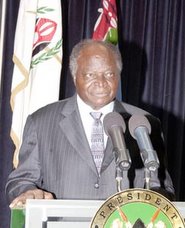


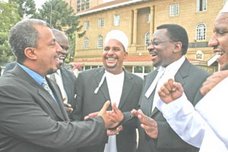
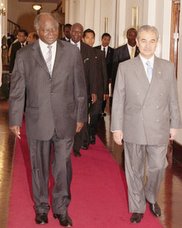

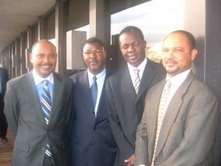
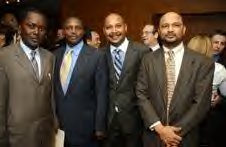
No comments:
Post a Comment